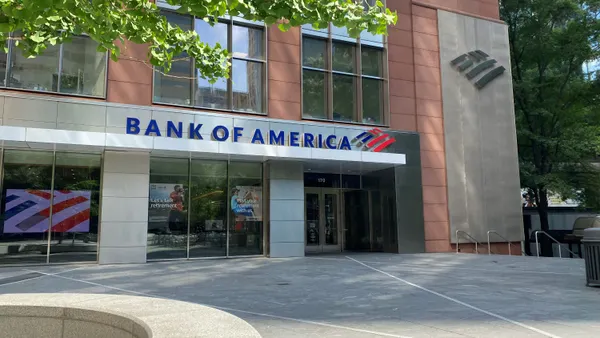Dive Brief:
- A measure passed in the California Assembly this year would allow municipalities in the largest U.S. state to establish public banks. Lawmakers in Washington, Michigan, New York and other states have studied public banking measures, according to the Public Banking Institute, a think tank. But only one state-run public bank currently exists in the U.S.: the Bank of North Dakota.
- The banking industry strongly opposes the movement in California, with critics saying there is no need for government intervention. The California Bankers Association (CBA) in May released the results of a survey of 600 people that found 60% of likely voters say they oppose the public banking measure.
- Challenges of public banking include startup costs, and questions as to who regulates the bank and how taxpayers are protected in case the bank fails. But proponents in North Dakota say the bank has helped finance work that the state otherwise may not have handled, such as construction projects during a recent energy-industry boom.
Dive Insight:
The case for public banks rests on the idea that taxpayers are overpaying to maintain and expand infrastructure. If a city were to redeploy tax revenue directly into construction work — via its own bank — it could save taxpayers huge sums on fees and interest.
Cities pay too much in fees when they park millions of dollars of public money in commercial banks, then borrow from those banks — paying hefty interest on loans — to fund local projects, according to the Public Banking Institute.
"The argument here is that if you take the profit motive out of the equation, you can get a better outcome for the greater society," said Lawrence White, a New York University professor and banking industry researcher.
However, Chris Cole, senior regulatory counsel for the Independent Community Bankers of America, said the motives behind public banking are well-intentioned but misguided and unnecessary.
"We have a really healthy private sector with banks and credit unions competing vigorously, and we have more and more non-banks partnering with these institutions to provide even more services," he said. "And if you get the government involved in the banking system, you have the risk of political decisions influencing who gets loans and who doesn't, and you risk putting taxpayers on the hook if a public bank doesn’t work."
About 70% of those who told the CBA they opposed public banks cited concerns about government overreach and a lack of accountability.
"In making the case for government-run public banks, proponents have also inaccurately claimed that the private banking sector has failed California," the CBA said in a statement accompanying the poll results. "However, the poll shows that nearly 90 percent of Californians are satisfied with their current bank or credit union."
Advocates in California say public banks could have the potential to help communities pay for affordable housing and projects to fight the effects of climate change. But it's expensive to launch a bank. The California Treasurer's Office estimated in 2018 that it could cost $35 million over several years to start a public bank and nearly $1 billion to run it.
Bill proponents say the state has the capacity to regulate a public bank through the Department of Business Oversight and that such banks would be required to buy insurance from the Federal Deposit Insurance Corp. — as private-sector banks do — or buy private insurance. They also said public banks in California would not compete head-to-head with the private sector.
The Bank of North Dakota typically works alongside private banks in its lending. Private banks administer loans, and the state bank backs them. The state deposits tax revenue in the public bank and uses it to finance projects intended to benefit the public.
Beyond the U.S., public banks are common in Canada, Australia, China and Germany. A publicly owned U.S. depository bank, the Territorial Bank of American Samoa, secured a charter last year.
The California bill is scheduled for debate next month in the state Senate Appropriations Committee.









